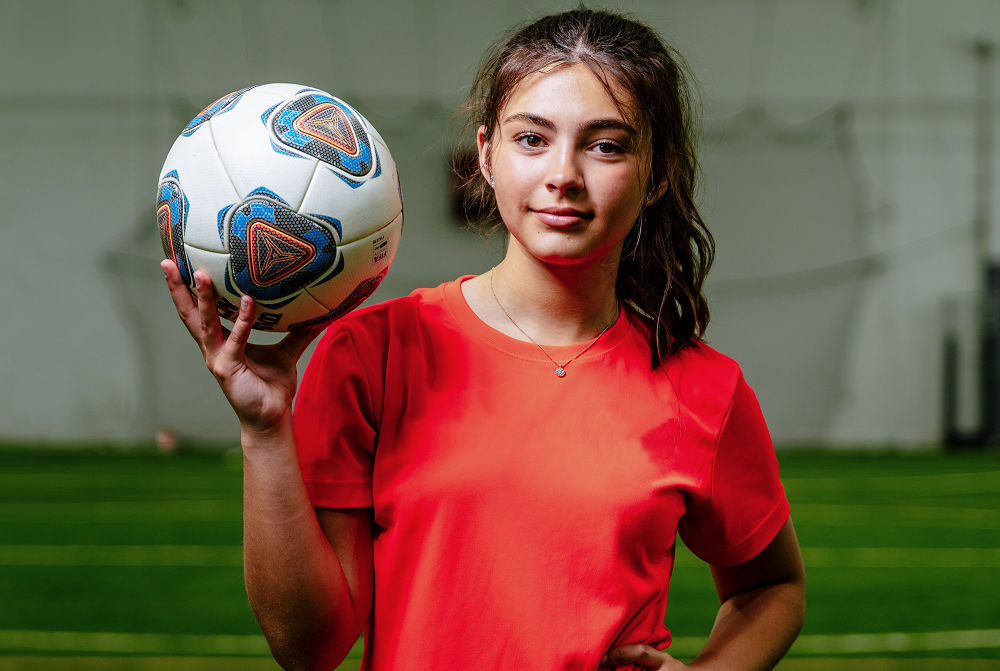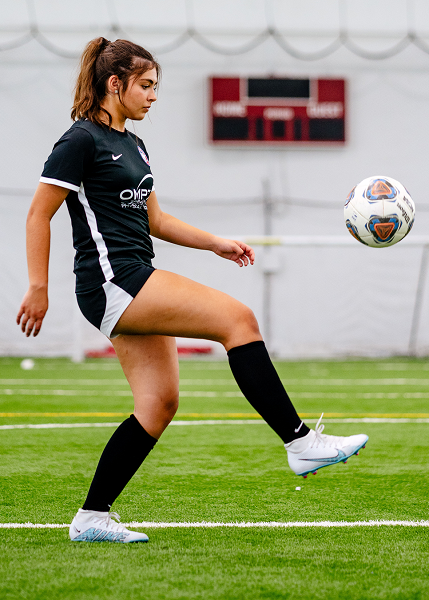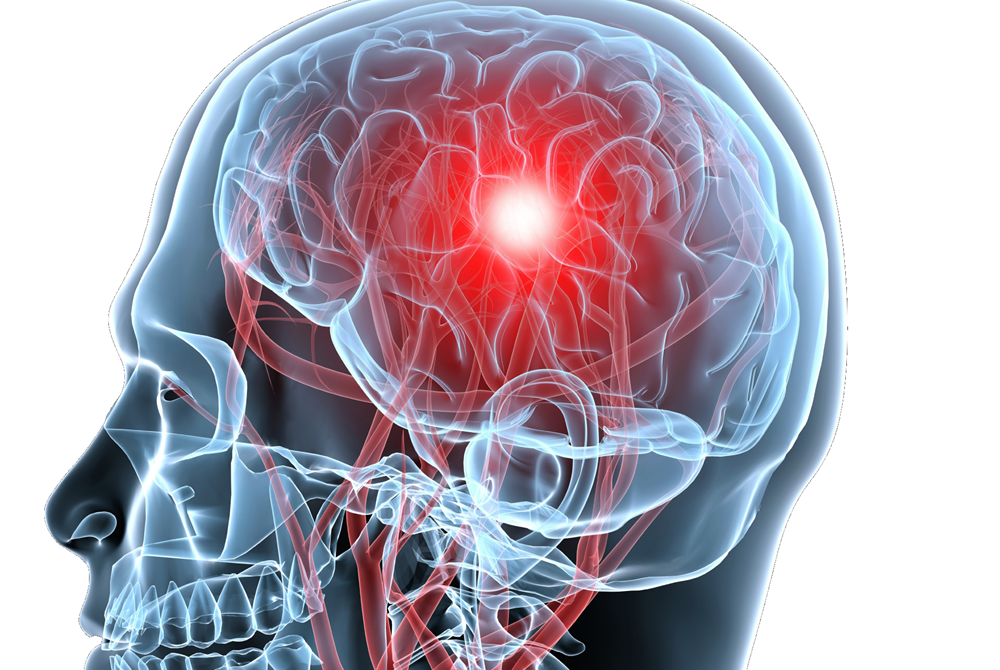
Macomb Lutheran North Standout on Mend After Knee Injury
October 3, 2023
Macomb Lutheran North freshman Emiliana Manzo has already achieved a long list of accomplishments, including a 3.8 grade-point average while juggling two sports she loves.
 As a point guard, she led her basketball team to an undefeated season in its division. She is also a center attacking midfielder, sometimes playing forward, on the 2009 Nationals Girls Academy Blue soccer team, ranked No. 1 in Michigan and 14th in the country.
As a point guard, she led her basketball team to an undefeated season in its division. She is also a center attacking midfielder, sometimes playing forward, on the 2009 Nationals Girls Academy Blue soccer team, ranked No. 1 in Michigan and 14th in the country.
In June of 2022, Emiliana hit a detour on her sports journey when she was participating in a club soccer national championship in Oceanside, Calif. With a few seconds left in the game and her team up 2-1, she ran 20 yards full speed to get to the ball. Hyperextending her left knee, she felt two pops. It was the first time she experienced an injury.
“I was screaming and crying and got taken off the field on a golf cart,” explains Emiliana. The trainer felt she was OK. Fortunately, she had the next day off and her knee was feeling better. The following day she played again, and 20 minutes into the game she knew there was an issue.
“Someone hit me from behind and I heard the pop again. I knew there was a problem.”
Emiliana’s father Vince Manzo said she experienced swelling, and the athletic trainer thought she may have a meniscus injury; however, she was able to continue to walk around during the championship in California before heading home.
Finding the Right Provider
Back in Michigan, Emiliana saw a few surgeons during her evaluation to seek treatment. When she met with Vasilios Bill Moutzouros, MD, chief of Sports Medicine at Henry Ford Health, she felt she met the right match.
“He treated me like an athlete and made me feel really comfortable,” she says.
 Vince adds that both he and Emiliana were also appreciative of something Dr. Moutzouros said during her evaluation: “He emphasized to Emiliana that she was an athlete before this injury, and she would be an athlete after the injury.”
Vince adds that both he and Emiliana were also appreciative of something Dr. Moutzouros said during her evaluation: “He emphasized to Emiliana that she was an athlete before this injury, and she would be an athlete after the injury.”
A detailed evaluation by Dr. Moutzouros revealed Emiliana had a complete anterior cruciate ligament (ACL) tear and medial and lateral meniscal tears. The meniscus, a C-shaped piece of tough, rubbery cartilage, acts as a shock absorber between the shinbone and the thighbone. It is one of the most common knee injuries. The ACL, one of the strong bands of tissue that help connect the thigh bone (femur) to the shinbone (tibia), is also prone to injury during sports when there are sudden stops or changes in direction.
Emiliana required physical therapy to get the swelling down and increase mobility before surgical repair.
Dr. Moutzouros reconstructed her ACL with her own patellar tendon graft and repaired her medial meniscus.
“She handled the surgery well and has been working very hard in her rehabilitation,” he says. “Her high-level soccer experience likely helped in her recovery as her range of motion and strengthening advanced so quickly.”
Understandably, Emiliana was nervous and scared when she went into surgery but expressed appreciation for the little things from Henry Ford like hearing “great music” as she was entering surgery, which gave her a sense of calm.
“That’s when I knew I picked the right doctor,” she said.
The Road to Recovery
As part of her recovery, after surgery which took place in July of 2022, Emiliana has undergone six months of physical therapy to increase mobility and strength training to get her leg strong again.
She also participated in the Return to Sport Program at the Henry Ford Center for Athletic Medicine to optimize recovery.
“We loved it,” says Vince. “It gave us peace of mind.”
Dr. Moutzouros explains that ACL prevention and rehabilitation programs are critical, especially for women because they have a four times greater risk of ACL tear than men. He says performance training post-surgery, along with an injury prevention program for those playing cutting sports, can markedly reduce the likelihood of future ACL injury.
“At Henry Ford, we work with physical therapists across the Midwest as well as our own. They do a great job in following our Henry Ford specific post-ACL reconstruction protocol,” he says. “After therapy runs its course, we strongly encourage our athletes to undergo performance training to allow a smooth transition back to sport.”
Nick Parkinson, supervisor of Athletic Training and Sports Performance at Henry Ford Health, emphasizes that the return to sport program is designed to bridge the gap between rehabilitation and returning to full activity in your chosen sport.
“Many times, insurance limits rehabilitation to regaining activities of daily living and not necessarily rebuilding the skills needed to play a sport or return to activity,” Nick says. “This program provides an affordable option to fill this need and return athletes to competition at the highest level.”
As for Emiliana, who hopes to play soccer in college and pursue a career in the medical field, she says this experience has taught her to not be afraid of injuries and treatment. She has also used the experience to volunteer for a program through the Girls Academy which serves as an advisory board to come up with ideas to help with mental and physical issues girls her age may be facing.
“For other kids who experience injuries, I’ve learned that this does not define you,” she said. “You can push through it, recover from it and be way better than you even were before.”
To find a sports medicine doctor or athletic trainer at Henry Ford, visit henryford.com/athletes.

How To Be Proactive About Concussions In Student Athletes
December 5, 2023
Most people have seen the headlines about concussions as a common sports injury—and it's natural that parents of athletes may have concerns. A large misconception in sports is that previous concussions are to be blamed for ongoing headaches, blurred vision and memory loss, among other symptoms.
 “It’s really important to think about concussions in tandem with overall brain health,” says Jake Carpenter-Thompson, M.D., Ph.D., a board-certified neurologist at the Henry Ford Kutcher Clinic for Concussion and Sports Neurology. “Concussions can be concerning, but they shouldn’t be looked at in a vacuum. It is important to understand an athlete’s overall brain health to help manage recovery after any impact.”
“It’s really important to think about concussions in tandem with overall brain health,” says Jake Carpenter-Thompson, M.D., Ph.D., a board-certified neurologist at the Henry Ford Kutcher Clinic for Concussion and Sports Neurology. “Concussions can be concerning, but they shouldn’t be looked at in a vacuum. It is important to understand an athlete’s overall brain health to help manage recovery after any impact.”
One way to do that is to consult with your child’s doctor or a sports neurologist for an annual evaluation. A sports neurologist focuses on managing sports-related brain and nervous system injuries and conditions in athletes, such as concussions, post-concussion syndrome, peripheral nerve injuries, migraines, epilepsy and more.
“Having an annual evaluation of your athlete’s brain health when they are at their baseline – and uninjured – can help diagnose and treat issues when they arise,” says Dr. Carpenter-Thompson.
A qualified healthcare professional can use the baseline evaluation results as an important comparison tool if an athlete develops a suspected concussion.
Best Practices For Keeping Athletes Safe
Dr. Carpenter-Thompson shares these tips to ensure you keep front of mind your child’s brain health and safety, not just their athletic performance:
- Get a brain health baseline test. This should include a personal and family neurological history, with a focus on current issues. It is important to note any neurological conditions that may influence concussion recovery, such as ADHD, depression, anxiety or migraine headaches.
- Encourage your children to listen to their body. There are risks to playing any sport. Encourage your child to listen to and be honest about how they’re feeling. It’s the best way to prevent and treat injuries.
- In the event of an injury, look for the signs. Within 24 hours after an injury, an athlete should be evaluated if they are experiencing: headaches, fatigue, dizziness and nausea, changes in sleep habits, trouble with memory, confusion, irritability and anxiety, or light sensitivity.
- Know that brain injuries don’t just occur with a blow to the head. They can also occur from falls, car accidents or even whiplash. If your child is experiencing any symptoms, consult your physician.
- Remember that brain health is more than just concussions. If your athlete is complaining of chronic headaches, migraines, dizziness, memory or mood issues, there may be an underlying issue.
“There is no magic number of concussions a brain can sustain. Each person is different,” says Dr. Carpenter-Thompson. “The severity of the impact and recovery time can vary greatly for numerous reasons. By getting a brain health assessment before the injury, we can provide more targeted care to improve an athlete's overall clinical course.”
To find a sports medicine doctor or athletic trainer at Henry Ford, visit henryford.com/athletes.

